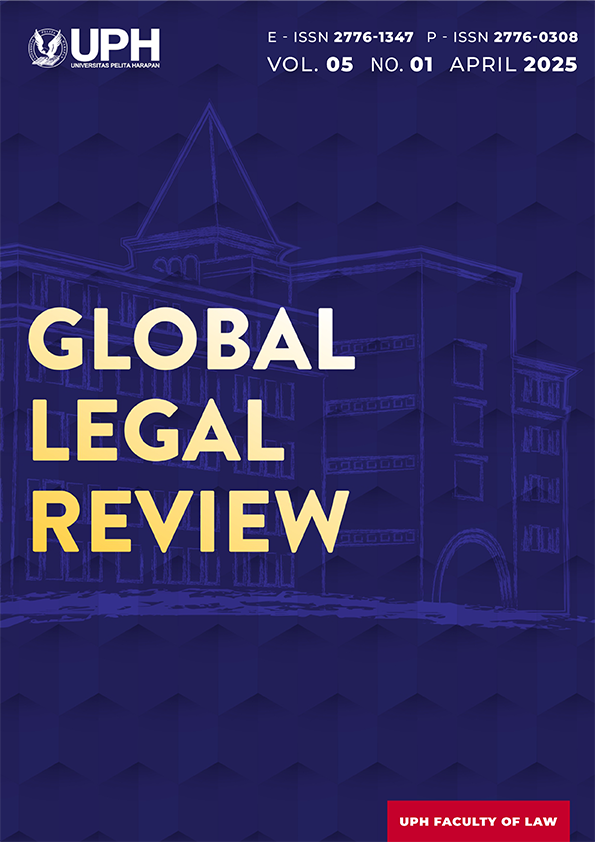Reformulation on Fiducia Security Enforcement Law in the Framework of Ease of Doing Business
DOI:
https://doi.org/10.19166/glr.v5i1.8618Λέξεις-κλειδιά:
Fiducia Security, Ease of Doing Business, Bank, Financial InstitutionΠερίληψη
Banks and non-bank financial institutions as distributors of funds to the public through credit (financing) to customers (debtors) using non possessory movable goods (known as fiducia security) as security. The existence of fiducia security has problems in terms of the enforcement that affect the ease of doing business. This research was conducted with the aim of analyzing the rules of enforcement of fiducia security and the implementation of these rules, starting from the problems that occur in the field, the factors that cause these problems to occur and the proposed solutions. The final objective of this research is to find an ideal formulation (reformulation) of the rules of enforcement of fiducia security in line with the needs of the business practice, which can be implemented so as to support the ease of doing business. The research method used is normative legal research with several approaches, namely statutory, conceptual, historical, comparative, and case approaches. The results of the research show that there is a need for improvement in the fiducia security enforcement system starting from the registration stage to the enforcement. The ultimate goal of the improvement is the creation of a fast, efficient and low-cost fiducia security enforcement system. The creation of the ultimate goal of improvement will have an impact on business ease, where from the debtor's perspective, it will be easy to access financing, while from the side of banks and non-bank financial institutions there would be a certainty in relation to the repayment of the channeled financing, which ultimately leads to the ease of doing business for all parties.
Αναφορές
Alvarez De La Campa, Alejandro, Everett Theodore Wohlers, Baranes Yair, and Sevi Simavi. Secured transactions systems and collateral registries. Washington, D.C.: World Bank Group, 2010. https://documentos.bancomundial.org/es/publication/documents-reports/documentdetail/755831486450371941/secured-transactions-systems-and-collateral-registries.
Alvarez de la Campa, Alejandro. Increasing Access to Credit Through Reforming Secured Transactions in the MENA Region. World Bank Group, 2011. https://openknowledge.worldbank.org/entities/publication/4f8c337a-d5b0-5d69-b463-aee54a89d081.
Arlyanto, Rakha. “Debt Collector Harus Pegang SPPI, Ini Aturan Penarikan Kendaraan Leasing.” Detik, May 10, 2021. https://news.detik.com/berita/d-5564994/debt-collector-harus-pegang-sppi-ini-aturan-penarikan-kendaraan-leasing.
DetikOto. "Polisi: Debt Collector Tak Bisa Sembarangan Rampas Kendaraan." DetikOto, May 11, 2021. https://oto.detik.com/berita/d-5565901/polisi-debt-collector-tak-bisa-sembarangan-rampas-kendaraan?tag_from=wpm_nhl_2.
H.S, Salim. Perkembangan Hukum Jaminan di Indonesia. Jakarta: Raja Grafindo Persada, 2004.
Hartono, Sri Redjeki. Hukum Ekonomi Indonesia. Malang: Banyumedia Indonesia Publishing, 2007.
Ibrahim, Johnny. Teori dan Metodologi Penelitian Hukum Normatif, revision edition. Malang: Bayumedia Publishing, 2008.
Meliala, Djaja S.. Perkembangan Hukum Perdata About Benda dan Hukum Perikatan. Bandung: Penerbit Nuansa Aulia, 2015.
Nurwitasari, Hera Dwi. “Problematika Berbagai Peraturan Eksekusi Obyek Jaminan Fidusia.” Jurnal Repertorium 1, no. 2 (November 2014): 32–37. https://www.neliti.com/publications/213001/problematika-berbagai-peraturan-eksekusi-objek-jaminan-fidusia.
Pranatia, Maria. “Penguatan Aspek Kepastian Hukum Dalam Sistem Pendaftaran Perjanjian Jaminan Fidusia Secara Online.” Dissertation, Universitas Pelita Harapan, 2020. Universitas Pelita Harapan Institutional Repository. https://repository.uph.edu/id/eprint/10847/.
Satrio, J.. Hukum Jaminan, Hak Jaminan Kebendaan Fidusia. Bandung: Citra Aditya Bakti, 2002.
Soekanto, Soerjono and Sri Mamudji. Penelitian Hukum Normatif. Jakarta: Rajawali Press, 1990.
Sofwan, Sri Soedewi Masjchun. Hukum Jaminan di Indonesia: Pokok-Pokok Hukum Jaminan dan Jaminan Perorangan. Yogyakarta: Liberty, 1980.
Λήψεις
Δημοσιευμένα
Πώς να δημιουργήσετε Αναφορές
Τεύχος
Ενότητα
Άδεια
Πνευματική ιδιοκτησία (c) 2025 Ibrahim Senen

Αυτή η εργασία είναι αδειοδοτημένη υπό το Creative Commons Attribution-ShareAlike 4.0 International License.
Authors who publish with this journal agree to the following terms:
1) Authors retain copyright and grant the journal right of first publication with the work simultaneously licensed under a Creative Commons Attribution License (CC-BY-SA 4.0) that allows others to share the work with an acknowledgement of the work's authorship and initial publication in this journal.
2) Authors are able to enter into separate, additional contractual arrangements for the non-exclusive distribution of the journal's published version of the work (e.g., post it to an institutional repository or publish it in a book), with an acknowledgement of its initial publication in this journal.
3) Authors are permitted and encouraged to post their work online (e.g., in institutional repositories or on their website). The final published PDF should be used and bibliographic details that credit the publication in this journal should be included.

